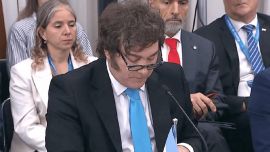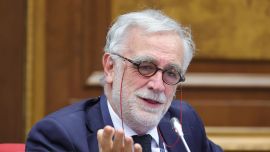Even though he talks continually of his “respect” for Máximo Kirchner and La Cámpora, Germán Martínez highlights the shades of difference which might explain his role within the ruling coalition and closer stance to the president.
Very close to Agustín Rossi, his comrade in the La Corriente faction also including Cabinet ministers Daniel Filmus and Jorge Taiana, Martínez explains in a lengthy interview how the lower house is preparing to discuss the IMF issue.
The 47-year-old, a native of Rosario, says that the “absence of austerity” and the grace period open up an opportunity for economic growth.
On your Twitter account you present yourself as “a Peronist and Kirchnerite without contradiction; from Rosario and Santa Fe province with no contradiction; and a La Corriente militant and a national deputy with no contradiction there either.” Are contradictions a problem for coalitions and especially for Frente de Todos?
Contradictions are intrinsic to political life and also an essential part of each and every one of us. Our self-definitions appear along with our self-interest in working with the least number of contradictions possible. That’s not a text I’ve just produced, I wrote it some time ago. The truth is that it reflects three situations which define me.
In Agustín Rossi’s first campaign for Congress in 2005 when he was running at the same time as Cristina was a senatorial candidate in Buenos Aires Province, we covered the province of Santa Fe. And since we knew that there was a confrontation within the broad spectrum of Buenos Aires Province with a spillover into the political debate of our province, while driving we did the exercise of how to link the great work and decisions of Néstor Kirchner with the historic banners of Justicialism. That responds to our bid not to be visualised as defining Kirchnerism as something different but as a natural evolution of the principles of Justicialism.
My identification with the postulates and work of Néstor and Cristina in no way contradicts being as close as possible to the principles of Juan and Eva Perón.
Max Weber poses another contradiction, between the ethics of responsibility and the ethics of conviction. Is there a contradiction for somebody like Máximo Kirchner, between the responsibility of heading the governing coalition’s caucus and his conviction when rejecting the agreement with the International Monetary Fund?
Weber at some point talks about “ideal types,” defining the broad tramlines between which political life may run. If something permitted Néstor, Cristina and Alberto to govern, it is that we can now live without a contradiction between responsibility and conviction.
Why? For a long time in the parliamentary sphere, there was a kind of unwritten rule – the governments handled the legislation and the opposition the discourse. But because of the strength of our parliamentary debates, we were not only capable of building majorities but also defending them with conviction because there were principles with which we felt identified.
I hope to tread this path when heading the caucus by making both things go hand in hand. I hope we have the responsibility to defend our government and generate the consensus needed for some policies but without renouncing the arguments which can only come from strong conviction over an issue. I will aspire to be strongly present in both fields – to generate majorities and try to offer debate where our relative truth can accept dispute.
The contradiction theme is fascinating, especially if the political model is organised within a coalition which is diverse by definition. In this same series of interviews, Miguel Ángel Pichetto said that La Cámpora’s destiny was to transform itself in time (both due to the advancing age and political evolution of its members) into a social democratic force. Does Máximo Kirchner’s decision to quit as caucus chief deny this idea of Pichetto? What will La Cámpora’s future be?
Perhaps Miguel was going over his own experience. He was one of the bastions of Renewal Peronism who has ended up today in Juntos por el Cambio. He’s a leader for whom I have great respect but whose recent course has been highly contradictory.
But moving away from Miguel, there is excessive pressure [on us] or a very special focus on one organisation in particular. It’s an organisation which I respect. In the province of Santa Fe we were fellow-travellers, as sometimes happens in politics and other times not.
When I started my Frente para la Victoria militancy I was under 30. You also cover ground politically, arriving at situations when you are not just a militant youth. You have to take responsibility for your own organisation. In my case now this is a first time but there are comrades who began to be municipal councillors, provincial and national deputies or senators. This opens up the prospect of being taken into account when carrying forward political militancy and institutional responsibility. That’s a key element.
We say that we are political militants who have some level of responsibility in a historical period of greater or lesser importance. We have to pass through that period without ever knowing how long it will last and trying not to renounce any of the things which we had proposed beforehand. I’ve been a deputy for the last two years and now I have the role of heading my caucus. As a political militant I never voted for nor defended anything about which I was not truly convinced. That is the experience of the enormous majority of Frente de Todos militants.
One of the characteristics of youth is that it ends. In that sense Pichetto’s observation is pertinent. What will La Cámpora turn into when its members are no longer young? Will it be something testimonial?
At some point the future of an organisation which I greatly appreciate will come under study. La Cámpora is a political organisation of comrades who started out when under 30 and are now in their 40s. They occupy roles of very great responsibility. It is an error to think that nothing happened in all this time. There are youngsters joining up and starting new agendas in all the political organisations and this one in particular, thus giving them dynamism and evolution.
Are these youngsters joining La Cámpora or will they create new organisations?
Today there are youngsters joining La Cámpora and Movimiento Evita, that’s what I’ve seen. They become political militants with, for example, a strongly environmental outlook. That was not the case 10 years ago. This feeds organisations which need to evolve in order not to stagnate. This also adds to the dialogue new agendas which form part of society and its sensitivities.
What reflection is warranted when the extreme sectors of both coalitions reject the agreement with the IMF?
I don’t see either government or opposition deputies as being that radicalised. Some stances are indeed stronger than others.
What word would you use to define them to replace “radicalised”?
There were times in which the words “extreme” and “radicalisation” led to ugly situations in Argentina, some very serious from the viewpoint of human rights. In many places in the world the process to stigmatise both socially and politically those with whom one disagrees starts with such terminology.
I prefer not to use those words. I don’t know what name defines that posture. Having different outlooks closer or further removed from the core of the coalitions is absolutely reasonable within a system moving towards a scheme of coalitions with ever greater sustainability.
The opposition coalition needs to stop the libertarians from cannibalising part of their electorate while the ruling coalition needs to stop the left from doing the same thing. Both face a threat and have an electorate to retain via a sort of rearguard action.
I see it the other way round. The saving grace of coalitions is being able to metabolise the differences. Without those outlooks, there would be no coalition and we would be a single party, losing the capacity to represent diversity.
Accepting that wealth is diversity in harmony, what would be your reflection on both the sectors not at the centre of each coalition agreeing with the rejection?
I would stand by the latest statement by Juntos por el Cambio and by how our own internal debate is going. How we are going to express our different outlooks on the house floor has yet to be resolved. I know that many will say that we’re almost there but in my eyes there’s still a long way to go. I’m going to work until the last moment for the greatest number of votes and the most convergence possible.
I’m sure that those who have the least responsibility in Juntos por el Cambio will try to do the same. Both in my coalition and the opposition you can find criticisms running beyond the point of equilibrium. I have to be sufficiently capable to identify what is proposed, to argue the case and to provide information permitting us to reduce the distances. If I achieve that, we could have greater convergence on the house floor. I will do all I have to in order to bring information closer and clear away doubts. I’m convinced that the road proposed by the president is the correct one.
Over and above the trend within the opposition coalition towards a unified positive vote. It is clear that their least centrist hawks are opposed or have misgiving, even if they end up voting in favour. I repeat the question, what does the agreement between the extremes suggest to you?
I’m not scared because the basis of the críiicisms is different. The opposition deputy Ricardo López Murphy rejects the agreement with arguments very similar to those of Alejandro Werner, one of the IMF negotiators of the agreement with Mauricio Macri or the columns of the Financial Times. They say that the agreement is bad because it does not oblige Argentina to carry out stiffer structural reforms. That is the criticism coming from the right.
In contrast, some of my comrades are saying: “Watch out with the agreement with the IMF because we understand that we want to grow but there could be the risk that if that growth is not enough, there will be public spending cuts.” They have lit that amber light. They are totally different positions. I feel much more comfortable talking to those who might have doubts about the fiscal path but with whom we share from the 2019 campaign onwards the efforts of our political space to arrive at better conditions for negotiating with the IMF. That’s very different from those who tell me that in reality we are falling short because more reforms are needed. The tasks we have within each coalition are the same but with the objective of representing them differently.
One might imagine that for the first time in Argentina there has appeared an issue leapfrogging the grieta chasm, over which the moderates in both coalitions agree, as do those we might call furthest from the centre, even if with different arguments. Is the IMF agreement the first case of the grieta being transcended in the Alberto Fernández Presidency?
Without coalitions, Néstor Kirchner paying off the IMF in late 2005 triggered the same debate. With no law to give it parliamentary channels, Kirchner issued an emergency decree. He did this as a heterodox tool because the debt payments were affecting reserves. At the same time he sent it to both chambers. We had just won a spectacular election, gaining an important base of support. At that moment the opposition was divided between the Radicals and Propuesta Republicana (PRO). Macri was a national deputy in agreement with ex-ARI sectors and also with voting against paying off the IMF.
We have to accept the presence of the IMF in Argentina, at least since the Revolución Libertadora (or the firing-squad revolution, whatever you want to call it) in 1955 until now. In the 2007 campaign, with Cristina as the presidential candidate and Alberto Fernández as her campaign manager, there was a spot which closed saying: “We’re going to work so that your children and the children of your children do not know what the IMF is.” Macri brought us back to that. US$44.5 billion borrowed in a single operation from a single creditor in a single operation took us back to a past which we believed to be behind us, imposing a timetable which implied paying US$19 billion this year and US$22 billion next year.
At the age of eight I loved reading. The first global and integral figure I remember for Argentina’s foreign debt at the close of the (1976-1983) dictatorship was US$45 billion. This debate is extremely unfair. We did not end up by magnifying the origin of the debt. We are discussing the solution as proposed by the president. I agree with that and I will argue it positively with anybody but we are not discussing the origin of the problem. It would seem that nothing happened in Argentina in 2018 and 2019. We will give that parliamentary debate, vindicating what happened.
The law for the sustainability of the public debt was a decision of Congress. We will debate it with total transparency, making everything known and with the agreement with the IMF on the table. The opposition leaders who were the government at that time could not show the 2018 agreement. Today it will be completely different.
Senate Majority Leader José Mayans pointed out that “we need more details” to gain consensus in the upper house. Do you agree? What might those details be?
I have the momentum of the caucus of deputies. As the debate draws closer, it will be increasingly necessary to know more details, even for those of us initially predisposed to back the agreement. Sometimes it is erroneously believed that the caucus whip is the great negotiator with the opposition but his first task is the internal front. Even when discussing with the opposition, he does so thinking of the argument he will be giving his own caucus. The economy minister said it clearly: “The totality of the agreement with the IMF will be at the disposal of Congress.” That’s what we will be debating. There have been articles speaking off-the-record of a light document with the details passing elsewhere. We will have precision in everything. [Deputies] might agree or disagree but there will be full knowledge of the situation, as promised by President Alberto Fernández when he took office. In Frente de Todos we knew that the agreement was a problem and steps would need to be taken to arrive at a solution. First came the negotiation with the private bondholders, and then this. When he took office, the president pledged himself to a process of serious negotiations, knowing that there was a problem. He also said that we cannot pay without growth. That is what we are saying now.
Will there be more predisposal to vote affirmatively with the details?
I will be working exactly towards that. The more information is circulating, the less doubts there will be. Some doubts are always going to remain because there are things we cannot even imagine enshrined in the document.
From my own caucus there are challenges based on the economic history of the country. They fear that the IMF will be widening the goal-posts, to put it in football terms – something not to be found in a technical document. It is logical for a political militant to present such doubts. To the degree that the information circulates, is analysed and clears away doubts, we will gradually grow. I’m serenely optimistic.
In what sort of time frame do you imagine this situation being resolved?
It will depend on how the formal entry [into Congress] ends up being consolidated. I would imagine it to be more in March than in February. If in February, it would require an expansion of the agenda of the extraordinary sessions. At some point Martín Guzmán spoke of four weeks passing between the announcement and the closure of the technical agreement. At the time of this interview the third of these weeks was drawing to an end. That’s the planned timetable. March 1 is an important day for Congress as the opening of ordinary sessions when the president must deliver his [state-of-the-nation] message. Then it will depend on which Chamber it enters. Supposing that it starts in the Chamber of Deputies, there will be a definition of committees which will surely be made by the Speaker. If you ask me, there would be an intense debate abbreviated in time and with the least number of committees possible in order to avoid any unnecessary delay. We must look at Congress but also at the agreement at the same time. Some caucuses might also request a bit more debate but we must also think that whichever chamber it enters, the approval will have to be completed by the other chamber, which will need time in order to review it calmly.
How would that timetable be?
If we do things well, around March 20 we will be able to have this issue resolved in both chambers.
Do you assign more possibilities to it entering the Chamber of Deputies, independently of your being prepared for both scenarios?
We all read and listen to and watch the same stuff so I’m preparing myself for having my work ready.




















Comments